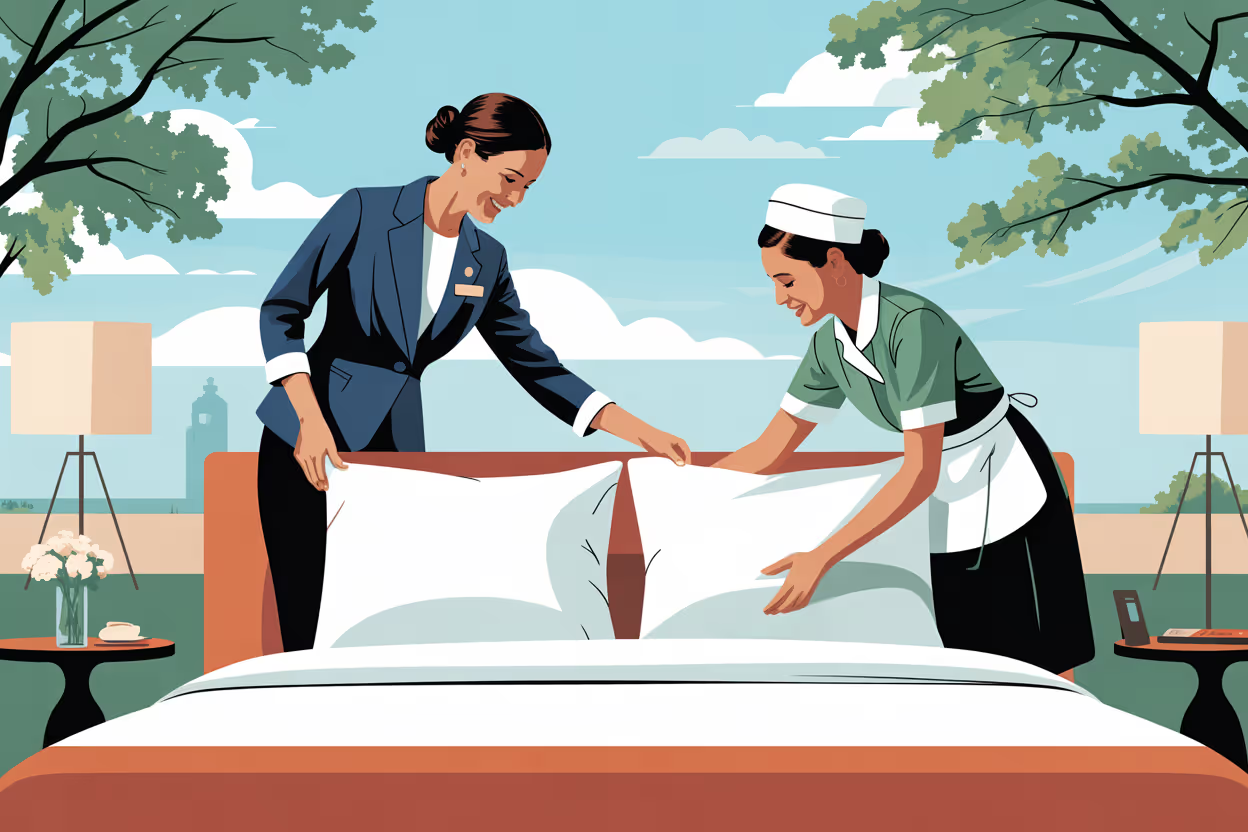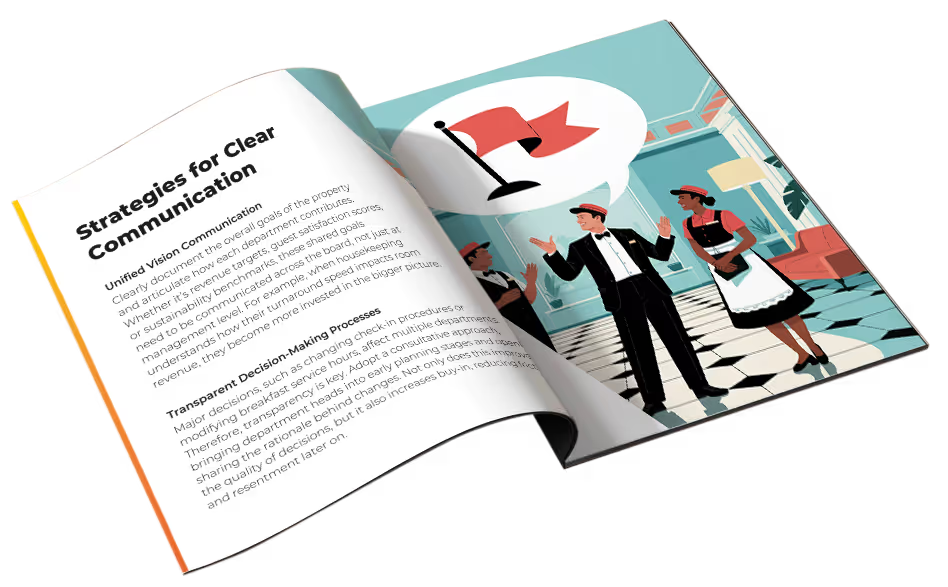Effective cross-department cooperation is fundamental in hotel operations, dramatically affecting guest satisfaction, operational efficiency, and overall hotel performance. The hospitality industry thrives on seamless collaboration between departments such as front office, housekeeping, maintenance, and food and beverage (F&B). Without proper cooperation, hotels risk operational inefficiencies that can damage guest experiences, harm their reputation, and ultimately affect profitability negatively.
When hotel departments collaborate effectively, they not only meet but exceed guest expectations. Such cooperation streamlines workflows, optimizes resources, and enhances the guest experience by ensuring services are consistently high-quality and responsive. For instance, when front desk and housekeeping staff coordinate closely, guest rooms are prepared promptly, reducing wait times and enhancing satisfaction right from arrival. Consequently, fostering a collaborative environment becomes a strategic priority for hotel managers aiming for excellence in service delivery.

Cross-department cooperation in hospitality refers to the harmonious interaction and alignment between various hotel departments to achieve common operational objectives. At its core, effective cooperation involves regular communication, mutual understanding of roles and responsibilities, and proactive support among departments. This collaboration helps departments anticipate guest needs, preempt potential issues, and respond promptly to requests, significantly enhancing overall service quality.
In practical terms, successful cooperation could mean housekeeping proactively notifying the front office when rooms become available, enabling a smoother check-in process. It also involves seamless interaction between the kitchen and the banquet team during events, ensuring timely food service that delights guests. The result is a superior guest experience, efficient operations, and increased guest loyalty, positioning the hotel ahead of competitors.
Overcoming departmental silos requires intentional strategies from hotel leadership
Despite the evident benefits, achieving effective cross-departmental cooperation can be challenging for many hotels. Several common issues often hinder smooth collaboration and create unnecessary operational friction.
One of the most prevalent challenges is departmental silos—when hotel departments function independently without sufficient interaction or information sharing. In such scenarios, housekeeping might not promptly update reception about room availability, leading to delays at check-in. Similarly, isolation between F&B and event management teams can cause confusion and last-minute problems during banquets or conferences, diminishing the guest experience.
Overcoming departmental silos requires intentional strategies from hotel leadership, fostering a culture where information is actively shared and collaboration is encouraged as a standard practice.
Communication gaps between departments frequently result in operational inefficiencies and guest dissatisfaction. Miscommunication can manifest as delayed updates from maintenance to housekeeping, causing unnecessary room delays, or insufficient information flow between reservations and reception, complicating guest arrival preparations.
Misalignment also occurs when departments lack clarity on shared objectives or priorities, leading to duplication of efforts and wasted resources. Hotels must establish robust communication protocols to minimize these issues and ensure timely information sharing.

Conflicting departmental priorities present another substantial challenge. Each department typically has distinct goals, which can sometimes conflict with others. For example, the F&B team might prioritize intricate menu preparation and presentation quality, while the front desk emphasizes efficiency and swift guest service. When these departmental goals are not harmonized, staff inadvertently work against one another, causing frustration and operational disruptions.
Leadership intervention is critical to align these differing objectives and ensure all departments understand the importance of collaboration in achieving overall hotel goals.
Employees often lack comprehensive awareness of how their tasks impact other departments. This limited perspective can cause significant disruptions, such as housekeeping teams being unaware of how their delays affect front office operations and, consequently, guest satisfaction.
Raising awareness through cross-training and regular inter-departmental meetings can significantly enhance mutual understanding and encourage proactive support across departments.
Hotel leaders must communicate the hotel’s vision clearly and consistently
Leadership is essential for effective cross-departmental collaboration. Managers and supervisors must actively encourage cooperation through clear communication, strategic alignment, and fostering a collaborative workplace culture.
Hotel leaders have several critical responsibilities to facilitate cooperation. Primarily, they must communicate the hotel’s vision clearly and consistently, ensuring all staff understand their roles in achieving the collective objectives. Regular strategic discussions and transparency about departmental goals and priorities are vital, enabling employees to see how their individual roles contribute to broader hotel success.
Moreover, leaders should actively facilitate communication by implementing structured collaboration tools and regular meetings. Encouraging face-to-face interactions, using digital platforms for rapid information sharing, and organizing regular cross-departmental training sessions can significantly enhance cooperation and minimize misunderstandings.

Achieving successful cross-department cooperation requires deliberate practices and a focused approach. Hotels must establish specific foundational practices that reinforce collaboration and effective communication.
A shared vision across departments is fundamental for successful cooperation. Ensuring everyone comprehends the hotel’s broader objectives, and clearly communicating how departmental goals contribute to these objectives, fosters a unified team spirit. Consistent messaging from management about collective achievements and how each team contributes strengthens this shared vision, motivating staff to collaborate proactively.
Front office employees who appreciate housekeeping’s workload are more considerate and responsive
Empathy is crucial for effective cross-departmental cooperation. Staff who understand the daily challenges faced by their colleagues are more likely to collaborate supportively. For instance, front office employees who appreciate housekeeping’s workload are more considerate and responsive, creating smoother operations and happier staff overall.
Hotels can enhance empathy by organizing regular inter-departmental interactions, such as joint training sessions or social events, fostering mutual understanding and respect.
Structured communication channels ensure consistent, reliable information exchange between departments. Regular meetings, daily briefings, and integrated communication platforms help departments stay informed, address issues promptly, and coordinate smoothly. Hotels implementing formal communication protocols typically experience fewer operational disruptions, streamlined workflows, and more proactive teamwork.

Effective cross-departmental cooperation significantly impacts hotel operations positively, driving both operational and strategic benefits.
Enhanced cooperation ensures that guest services are delivered seamlessly, meeting and exceeding expectations. Guests experience faster check-ins, better-maintained rooms, and more responsive staff, significantly enhancing their stay and increasing the likelihood of repeat visits.
Improved cooperation results in fewer operational delays, reduced errors, and better resource allocation. When departments communicate effectively, tasks such as room cleaning, guest arrivals, and event management are executed smoothly and efficiently, significantly improving operational performance.
Effective collaboration fosters a positive work environment, leading to improved employee morale. Staff who experience fewer operational frustrations and clearer role definitions report higher job satisfaction. This satisfaction translates into lower employee turnover, reducing recruitment and training costs and contributing to sustained operational success.
Intentional and strategic cross-department cooperation is vital for hotels aiming for operational excellence. Effective collaboration ensures superior guest experiences, efficient operations, and enhanced staff morale, positioning hotels ahead in a highly competitive market.
For concrete tips on this topic, explore our guide with practical strategies hotels can implement to overcome common barriers and further enhance inter-departmental collaboration.

The all-in-one solution for your hotel



When hotel teams work in silos, service suffers. The most successful properties are those that build bridges between departments. In this guide, you’ll find practical strategies used by top-performing hotels to break down barriers, boost communication, and align everyone around shared goals.

Secure your spot on our exclusive monthly mailing list,
VIPS Access, to unlock this guide, plus more practical insights for hospitality professionals.

You can download it through the button below, or via the link in your inbox.